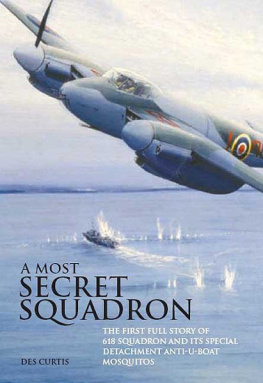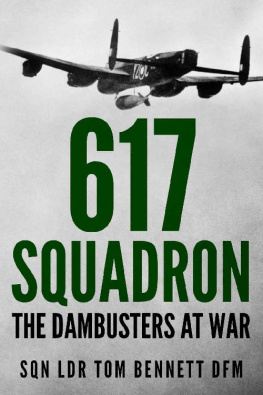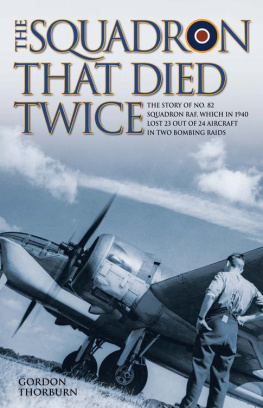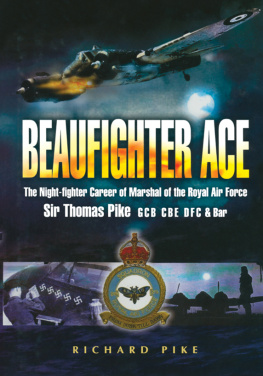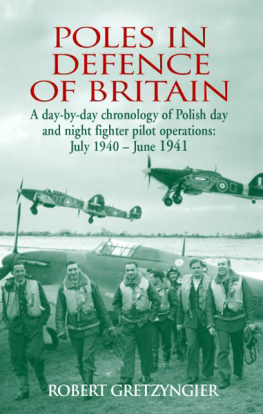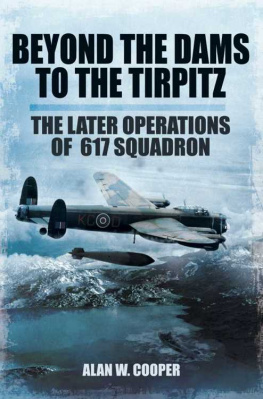Originally published in 1995 by Skitten Books, Wimborne, Dorset
This edition first published in 2009 by
Grub Street Publishing
4 Rainham Close
London
SW11 6SS
Copyright Grub Street 2009
Text copyright Des Curtis DFC 1995
British Library Cataloguing in Publication Data
Curtis, Des.
A most secret squadron : the first full story of 618
Squadron and its special detachment anti-U-Boat Mosquitos.
1. Great Britain. Royal Air Force. Squadron, No. 618 History.
2. World War, 1939-1945 Aerial operations, British.
3. Mosquito (Military aircraft) History.
4. World War, 1939-1945 Regimental histories Great Britain.
I. Title
940.5'44'941-dc22
ISBN-13: 9781906502515
EPUB ISBN: 9781909808843
All rights reserved. No part of this publication may be reproduced, stored
in a retrieval system, or transmitted in any form or by any means electronic,
mechanical, photocopying, recording, or otherwise, without the prior
permission of the copyright owner.
Printed and bound by MPG Ltd, Bodmin, Cornwall
Grub Street uses only Forest Stewardship Council (FSC) paper for its books.
I must tell you that each of you has been specially selected to join this squadron, and that the particular operation for which we are now training is going to be dangerous, with possibly heavy losses. So, if any of you feel that you would not want to be part of this, you are free to say so now. So, if you want to opt out, please step forward. I promise you that you will be returned to the squadron from which you came, without any stain on your records whatsoever.
Wg Cdr G. B. Hutchinson, DFC
This book is dedicated to all those men
who stood fast, and to all the other men
and women who served in 618 Squadron
and 618 Squadron Special Detachment,
Coastal Command
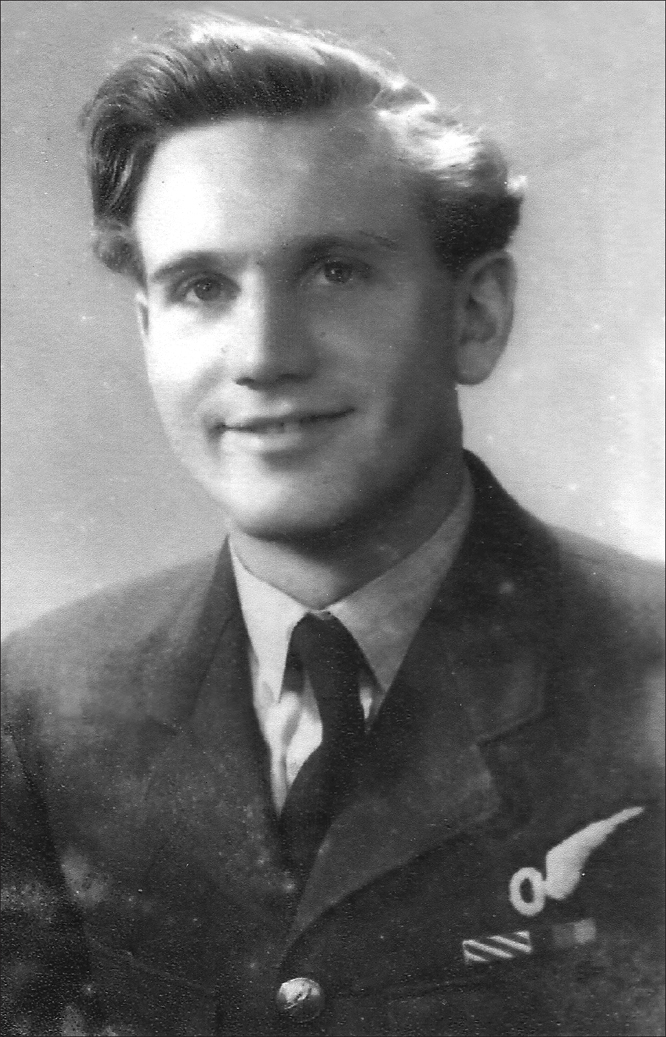
The author in June 1944.
Contents
Appreciation
The major part of this book relates to the plans to mount, at short notice, a low-level daylight attack on the German battleship Tirpitz using Mosquito aircraft and the bouncing bomb. This plan was fraught with difficulties, not least because of the distance of the target, but for the need for absolute secrecy. The author has successfully brought together, in an easily understood style, the complex considerations, at very senior level, of mounting this operation with an unproven weapon, and the constricted atmosphere within which aircrew made their preparations.
Plans to attack the Tirpitz with the bouncing bomb were finally abandoned and a detachment of 618 Squadron then undertook anti U-boat and anti-surface vessel activities. Their specialist use of a 57 mm gun is a story in itself and compensated greatly for the frustrations and disappointments of the earlier aborted plans.
A well researched, very readable and well presented book that demonstrates the use of crews with unique training in Mosquito handling and Coastal Command skills.

Air Marshal Sir Ivor Broom
KCB, DSO, DFC, AFC
Foreword
The whole world knows of the daring exploits of No. 617 (Lancaster) Squadron of RAF Bomber Command, when they bombed the Ruhr dams on the night of 16th/17th May 1943. The pundits and military historians will continue for decades to argue whether or not that bombing was successful in military and economic terms.
Little was known of a squadron that was formed within Coastal Command within a few days of the formation of 617 Squadron, that would be using the same principle of weaponry in the Mosquito aircraft. Its secrets remained out of the public domain for many years after the ending of the Second World War.
This book, whose author was one of the founder members of that squadron, attempts to recount the story of No. 618 Squadron, as seen both at the level of the Chiefs of Staff in their planning of the war effort, and from the viewpoint of the pilots and observers who were selected to make up the complement of crews.
Coastal Command was, at all times, closely allied to the Royal Navy, and the Royal Navy were the higher authority when it came to the selection of individual marine targets. The only time in this history when the Royal Navy attempted to pull rank was in its assertion that the Fleet Air Arm should be the first squadron to fly twin-engined Mosquitos from an aircraft carrier. No. 618 Squadron won the day, thanks to the clear decision of Sir Charles (later Lord) Portal, the Chief of Air Staff.
When the Bristol Beaufighter two-seater aircraft was introduced into Coastal Command the second member of the crew had to navigate, operate the wireless and D/F equipment, take aerial photographs and occasionally use the Vickers machine gun to defend the aircraft. That person was categorised as an Observer/WT a name that carried over from the early days of the RFC. The flying brevet was a letter O attached to a single wing; NCO Observers wore the Lightning Flash badge of a wireless operator above the chevrons on the sleeve. Individuals who had completed the extra training to qualify as Observers/WT were very proud of that aircrew category.
No 618 Squadron was formed with crews from both Coastal and Bomber Commands. The crews from Bomber Command were referred to as Pilots and Navigators. In 1944 Air Ministry instructed that the aircrew category Observer would be discontinued and Observers would then be known as Navigators, wearing a half-brevet with the letter N within laurel leaves. Most of 618 Observers chose to disregard this change of status, however. Air Ministry itself continued to refer to Observers in the August 1945 edition of Pilots Notes for the Mosquito Mk XVIII, which was flown by some of the 618 Squadron crews.
But, in this book, the Observer or Navigator, as the second man in the 618 Squadron Mosquitos, have the same meaning.
The highly secret nature of the squadron resulted in some of the normal squadron records being incomplete. This was particularly true of some of the operations involving 618 Squadron Special Detachment, when no mention of the names of its aircrew was made by the squadron to which it was attached. The author has attempted to fill as many of those gaps as possible.
Each crew member was personally selected to serve with the squadron. They were not just the usual ration of Pilot Officer Prunes, as the Commander-in-Chief, Coastal Command so aptly remarked.
Some references have been made of the exploits of some of them either before joining 618 or after leaving it. This is not to denigrate in any way the skills, boldness and bravery of others who have not been so mentioned.
Acknowledgements
The author gratefully acknowledges the assistance given, principally by that most efficient establishment, the Public Records Office, Kew. Material included in this book from that source is Crown copyright and is reproduced with the permission of the Controller of Her Majestys Stationery Office. The Trustees of the Imperial War Museum provided the photographs of the German warships in Altenfjord, Norway. Brooklands Museum, Weybridge, provided some interesting photographs of some of the trials in which the Mosquito aircraft of 618 Squadron were involved. The Royal Air Force Museum provided a photograph.
My thanks also to Leon Murray for his patience in reading the first manuscript and for his helpful comments and suggestions; to Doug Turner, Jimmy Hoyle and Aubrey Hilliard for access to their personal memorabilia. Others who have provided information include Frank Gee, Malcolm Holmes, and Tim Murray in Vancouver, to all of whom I am also grateful.
Next page
